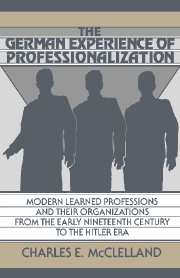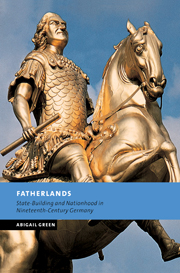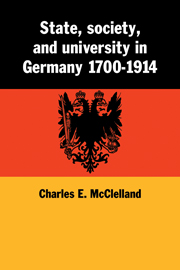The German Experience of Professionalization
Modern learned professions (medicine, law, teaching, engineering, and others) developed in central Europe just as vigorously as in England or America. Yet their close relationship with state power--more typical of the world development of professions than the Anglo-American model--led to a different historical experience of professionalization. This work is the first to explore that experience in a comprehensive way from the time when modern learned professions arose until the eve of World War II.
Based on the history and surviving records of German professional organizations, this work shows how the learned professions emerged gradually in the nineteenth century from the shadow of strong state regulation to achieve a high degree of autonomy and control over professional standards by the First World War. By studying professional groups collectively, it gives a more contoured picture of their fate under National Socialism than works dedicated primarily to the phenomenon of fascism itself.
- Examines the relationship between 'educated' professions and the government
- Compares the large-scale state intervention experienced by the professions in central Europe with the laissez-faire Anglo-American relationship
- Clearly reveals how the professions were treated in times of crisis, particularly the rise of the Nazi regime
Reviews & endorsements
"McClelland has provided a valuable survey of national organizations and periods of professional development which will provide a framework for more detailed future research, and which usefully links the history of professional groups to the history of state and society." Canadian Journal of History
"Unrelenting concentration on the lessons of empirical analysis for professionalization theory, which make possible conclusions such as this, surely constitute the great strength of McClelland's book....considerable achievement in the field of professionalization theory." Kees Gispen, Journal of Social History
"...historians interested in the professions will find much that is valuable in this book. McClelland's international comparisons are particularly commendable" Isis
"...a very useful survey of an increasingly important field of study." Geoffrey Cocks, American Historical Review
"...pioneering work....If McClelland's book will serve to draw historians of education into the comparative study of the professions, their education, and their work, it will have served far beyond being an informative and enlightening contribution to our understanding of its subject matter." Jurgen Herbst, History of Education Quarterly
"Logically organized and clearly written, the book provides a comparative view of German professionalization. In discussing this process, McClelland examines in detail various professionalization theories and their validity for German developments. The result is an excellent single-volume introduction to the professions in nineteenth- and early twentieth-century Germany....With its comparative description of the major professions and thorough discussion of professionalization issues, The German Experience of Professionalization is a highly accessible history of modern German academic occupations. It will be an invaluable source of information for anyone interested in these occupations and the German middle classes." Vincent A. Clark, German Studies Review
Product details
June 1991Hardback
9780521394574
268 pages
236 × 157 × 21 mm
0.53kg
Available
Table of Contents
- Acknowledgments
- Abbreviations
- Part I. The Problem of Professions in Germany:
- 1. Introduction
- 2. Problems and methods in the history of modern German professions
- Part II. The Transition to Modern Professions in the Early Nineteenth Century:
- 3. The beginnings of modern professions in Germany
- 4. Professions between revolution and unification
- Part III. Unified Professions in a Unified Germany?
- 5. The organization of the 'free' professions: medicine, law, engineering, and chemistry
- 6. Organization of state-service professions: teachers and the clergy
- 7. Professional credentials in the new Reich
- Part IV. Breakthrough and Breakdowns: The Professions Enter the Era of Cartels and Unions:
- 8. The 'free' professions, 1900–1918
- 9. Law-based professions, 1900–1918
- Part V. The Weimar era:
- 10. The 'free' professions under Weimar
- 11. Professions based on law and pedagogy in the Weimar era
- Part VI. The Fate of Professions Under and After Fascism:
- 12. Collaboration, coordination, and professionalization
- 13. Conclusion
- A word about sources
- Index.









